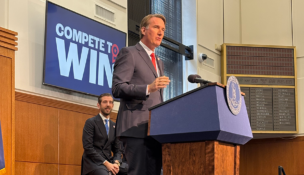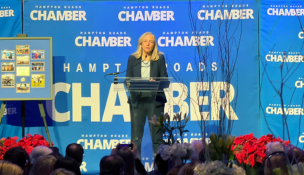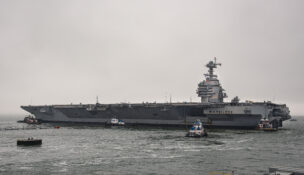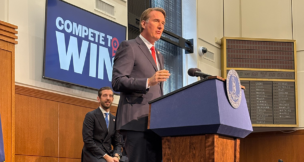U.S. port strike starts; Port of Va. stops cargo operations
In first strike since 1977, 45,000 dockworkers walk off job from Boston to Texas
Kate Andrews //October 1, 2024//

International Longshoremen's Association workers strike at the Port of Virginia on Oct. 1, 2024, when there was a mass work stoppage at ports on the East and Gulf coasts. Photo by Mark Rhodes

International Longshoremen's Association workers strike at the Port of Virginia on Oct. 1, 2024, when there was a mass work stoppage at ports on the East and Gulf coasts. Photo by Mark Rhodes
U.S. port strike starts; Port of Va. stops cargo operations
In first strike since 1977, 45,000 dockworkers walk off job from Boston to Texas
Kate Andrews //October 1, 2024//
Oct. 3 update: Strike is suspended
About 45,000 International Longshoremen‘s Association (ILA) workers walked off the job midnight Tuesday at the Port of Virginia and every other major port along the East and Gulf coasts, launching the ILA’s first U.S. port strike in 47 years.
Dockworkers hit the picket lines after the union reached an impasse in contract negotiations with the United States Maritime Alliance (USMX), which represents shipping employers such as Maersk’s APM Terminals.
The port strike is the largest such action since 1977 and, depending on its length, it could cause massive disruptions to the nation’s supply chain and negatively affect the U.S. economy.
Outside of Virginia, other affected ports include: Baltimore; Boston; Brunswick, Georgia; Charleston, South Carolina; Houston; Mobile, Alabama; New Orleans; New York/New Jersey; Philadelphia, Savannah, Georgia; Tampa, Florida; and Wilmington, North Carolina. Here in Virginia, the immediate impact was felt at the Port of Virginia’s marine terminals in Hampton Roads, where no cargo is moving in or out of the port during the walkout. According to the port, there are no cargo operations taking place at Norfolk International Terminals, Virginia International Gateway or Newport News Marine Terminal, which are currently closed.
However, employees of the Virginia Port Authority and at its operating company, Virginia International Terminals, are still at work. “Richmond Marine Terminal (RMT) and Virginia Inland Port (VIP) are operating per normal, but cargo operations there will be affected by what is happening locally. Portsmouth Marine Terminal (PMT) is operating per normal,” the port said on its website Tuesday.
“The International Longshoremen’s Union and United States Maritime Alliance must reach a fair and equitable deal as soon as possible to ensure operations can continue at the Port of Virginia and other port facilities along the East and Gulf Coasts,” U.S. Sens. Mark Warner and Tim Kaine and U.S. Rep. Bobby Scott said in a statement Tuesday. “We urge both sides to work in good faith towards a new contract, and we’ll continue to monitor this situation as it develops.”
In a letter obtained by Virginia Business that was sent last week to President Joe Biden and Vice President Kamala Harris, Virginia Gov. Glenn Youngkin had urged the Biden administration to “take all actions under your authority to bring the U.S. Maritime Alliance and the International Longshoremen’s Association to the table to reach an agreement and avert a coastwide strike.” Youngkin issued a statement Tuesday: “Every day this strike of port workers along the East and Gulf coasts continues, the economic impacts intensify, affecting livelihoods, supply chains and prices. The economic fallout from the work stoppage at the Port of Virginia extends well beyond the commonwealth, as the port manages approximately $66 billion in essential imports, with nearly 60% destined for locations outside of Virginia. As a cornerstone of Virginia’s economy, the port supports 10% of the gross state product and supports employment for over half a million jobs in Virginia.”
The ILA and the USMX have been negotiating a new master contract to cover East Coast and Gulf Coast union workers. In Virginia, the Hampton Roads Shipping Association represents employers, while ILA Locals 970, 1248, 1624 and 1970 represent unionized workers at the Port of Virginia.
At Virginia International Gateway, Norfolk International Terminals and the Newport News Marine Terminal, picketers carried strike signs Tuesday morning and said they plan to be present 24 hours a day until the strike comes to an end. “People say we make a lot of money, but the work we do is very dangerous,” said picketer Derrick Perry, a 19-year Port of Virginia worker and a union spokesman for ILA Local 1970, which provides maintenance and repairs at the port. “We worked during COVID to keep the country running, and a lot of our fellow workers got COVID and died. At this point, we just want to be compensated. We are out here in solidarity. This is not something we want to do, but we have to because it affects so many people.”
Virginia impact
“The Port of Virginia is one of the three pillars of the Hampton Roads economy,” Old Dominion University economics professor Vinod Agarwal said Tuesday. “If something adverse happens to the port, Hampton Roads and the commonwealth will be affected.” The strike’s impact will increase the longer it lasts, added Agarwal, who is also deputy director of ODU’s Dragas Center for Economic Analysis and Policy. “About two-thirds of [all] cargo through Port of Virginia goes by train. Rail lines will also be impacted within a month or two. That’s when things get to be interesting, and you’ll see much more widespread impacts.”
Many businesses and workers will be affected if the strike lasts more than a week or two, and consumers will start to see empty shelves after about three months, Agarwal noted. And while many retailers purchased additional supplies in anticipation of the strike, especially with the holiday shopping season on the horizon, shortages could still occur depending on the length of the strike, he added. Virginia exporters — including agricultural producers — also will be affected. Overseas shippers are likely to reroute shipments to West Coast ports, which are not impacted by the strike, and from there, shipments will come to the East Coast by train.
“Obviously, that causes an increase in time and adds to the cost of shipments,” Agarwal said, and that could have long-term implications if shippers get used to sending their products to the West Coast and continue to do so after the strike ends.
Also impacted will be Virginia companies that import components from abroad that are assembled stateside; an example, Agarwal said, is power tools manufacturer Stihl, a German company with its U.S. headquarters and a major assembly plant in Virginia Beach. “If those companies don’t have enough supplies on hand to use in the production process, they will have to start laying off people.” “Truckers will also be losers if the strike continues,” he added. “Their services will no longer be needed, and it will take some time to catch up with lost earnings.”
“I think everybody has anticipated it,” Virginia Trucking Association President and CEO P. Dale Bennett said Tuesday. “For the past two weeks, the prospects of getting it resolved have looked dimmer and dimmer as time went on. Truckers, their primary businesses serving the Port of Virginia, are definitely going to be impacted. They’re looking to try to do other things, haul other kinds of freight that isn’t impacted by the [strike]. That equipment sitting idle isn’t making the revenue they need to make truck payments and pay employees and take care of other expenses that don’t go away because the freight’s not there.”
For the general public, “there’s a significant amount of goods that we use that come through the ports up down the East Coast and from the Gulf Coast, and that’s all come to a standstill,” Bennett added. “It’s estimated for every day there’s a work stoppage at these ports, it will take five to seven days to recover, so do the math.”
The Port of Virginia was busy last weekend, staying open extra hours to accommodate trucks seeking to pick up containers before the strike started, according to officials with Mount Crawford’s Interchange Group, a third-party logistics company with more than 3 million square feet of warehouse space and a fleet of 90 trucks.
David Bosserman, Interchange’s transportation general manager, said his company was able to get about 45 containers out of the port last weekend. Customers started calling last week, expressing concerns about getting products from the Port of Virginia’s Hampton Roads terminals, he said Tuesday.
Chris Thompson, Interchange’s vice president of business development, said that if the strike lasts a while, Interchange may pivot to other domestic trucking work not tied to the ports, including domestic shipping work on the spot market. A spot rate or spot quote is a one-time fee that a shipper pays to move a load or shipment at current freight market pricing.
“Short term, we can probably overcome a little bit of the … stoppage, but the longer this goes, the more of an impact this is going to have,” Bosserman said. “After that, we’re going to have to find alternative work.” Thompson says Interchange hopes to avoid layoffs, though.
Stihl Inc. President and CEO Chris Keffer called the Port of Virginia “crucial” to its success, “enabling us to export chainsaws and power tools from our Virginia-based manufacturing facility to over 80 countries. While we hope for a swift and mutually beneficial resolution, it’s important to note that Stihl has diversified its supplier base in recent years to mitigate the effects of short-term supply chain disruptions. We remain well-positioned with strong inventory levels both domestically and internationally to support our customers.”
Keffer said Tuesday that Stihl is making “minor adjustments to our import/export plans and closely monitoring the situation,” and that “there is no immediate impact to workers because of the strike.”
Ricardo Ungo, an assistant professor in ODU’s Department of Information Technology and Decision Sciences who specializes in supply chain research, said that consumers may start purchasing more supplies like toilet paper and paper towels than usual because of the strike — which in turn will lead to a faster decline in inventory. But so far, most Americans haven’t seen any direct impacts from the strike.
“When we talk about imports into the U.S., about 60% come by water to seaports on East and Gulf coasts,” Ungo said. “Out of that, about 75% to 80% are containers. Imports will simply get delayed. There will be costs associated with the original cost of storing items in a different part of the supply chain. It’s not that imports will disappear, but there will be delays and additional costs.”

A more immediate impact, Bennett noted, is due to damage from Hurricane Helene across Southwest Virginia, western North Carolina, eastern Tennessee and nearby regions. Road closures have impacted truckers, creating “a big unknown — trying to deal with the impacts of the hurricane. [The strike is] certainly going to have a detrimental impact on getting what those folks need to have. Hopefully it won’t delay their path to recovery.”
If the strike goes on very long, he added, “This is going to have a significant impact and certainly disrupt the supply chain, and that’s going to hurt. It’s going to hurt folks. We have signed onto a letter calling on the White House to do everything they can to bring the parties together and get this worked out. … There’s not a lot Congress can do about it. It’s strictly in the hands of the two parties involved under negotiations and the White House under the Taft-Hartley Act.”
Also known as the Labor Management Relations Act, the 1947 law limits unions from conducting certain kinds of actions, prohibiting jurisdictional and wildcat strikes, solidarity strikes and secondary boycotts, as well as letting the president intervene in labor disputes by calling an 80-day cooling-off period. However, Biden said Sunday that he doesn’t intend to intervene in the port strike.
Youngkin’s statement Tuesday called for Biden to take action. “The time for leadership is now, President Biden has the tools to remedy this situation for the Commonwealth of Virginia and the nation, including utilizing provisions of the Taft-Hartley Act. The well-being of Virginia and American workers, as well as the health of our economy, depends on a swift resolution to this strike. A failure to lead will only drive up prices, disrupt trade and exacerbate the challenges already faced by Virginians and Americans.”
In his letter last week to Biden and Harris, Youngkin faulted the White House for reports that “no substantive meetings have happened” between U.S. officials, USMX and the union since June, adding that “such inaction has jeopardized the economic security and well-being of America.” In addition to the national impact on supply chains for consumer goods, pharmaceuticals, manufacturing and agriculture, “Virginia’s largest industries, agriculture and forestry, would be severely impacted” by the port strike, Youngkin wrote.
“The Port of Virginia supports 10% of gross state product [and] 11% of total employment, including 2,600 longshoremen employed at the Port and approximately an equal number of truck operators. “In Virginia, employers and local ILA management have a productive relationship,” the governor added. “The Hampton Roads Shipping Association and the local ILA finished their negotiation in June. However, as you know, the national ‘master contract’ must be agreed and ratified before the ILA local members in the commonwealth can act.”
Rachel Shames, vice president of pricing and procurement for Norfolk-based logistics and trade compliance company CV International, said Tuesday she’s also watching to see how long the strike will last. “There are some that firmly believe that this will be two to three days, and they’ll come to an agreement and things will start moving again. There will be certainly a backlog … but if that were to happen … we’ll avoid the worst of potential disruption.”
However, if the strike extends into several weeks, “it will be much, much, much more disruptive,” Shames said, with costs increasing and being passed on to shippers and possibly consumers. “I think the question now is just … is this going to be over in a few days, and we can start digging out and moving forward, or is this going to last into the weeks, and impacts will be broader?” French shipping giant CMA CGM’s America operation, based in Norfolk, wrote to customers Tuesday that it implemented contingency plans ahead of the strike, noting: “For all cargo received on or after Oct. 11, a Local Port Charge (LPC) will apply as per the governing tariff(s). Cargo received on or after Oct. 11 will not be subject to additional operational costs.”
National impasse
“Even though the ILA’s members worked tirelessly during the pandemic to ensure that the nation’s commerce flowed and continue to sacrifice time with their own families so that goods can arrive in the homes of other families throughout the world, still, due to corporate greed, employers refuse to compensate the ILA’s members fairly,” the union said in a statement released last week.
“Over the last several years, the net revenues of these companies have grown astronomically from hundreds of millions to billions of dollars while ILA members’ wage increases do not even cover the cost of inflation. The ILA is fighting for respect, appreciation and fairness in a world in which corporations are dead set on replacing hardworking people with automation. Employers push automation under the guise of safety, but it is really about cutting labor costs to increase their already exceptionally high profits. As the last six years have demonstrated, automation cannot outperform the skilled men and women of the ILA. Automation of our nations’ ports should be a concern for everyone; the truth is, robots do not pay taxes, and they do not spend money in their communities. The ILA will continue to fight until its members receive the fair contract they deserve.”
In an update Monday night, the USMX wrote: “In the last 24 hours, the USMX and ILA have traded counter offers related to wages. The USMX increased our offer and has also requested an extension of the current master contract, now that both sides have moved off their previous positions. We are hopeful that this could allow us to fully resume collective bargaining around the other outstanding issues – in an effort to reach an agreement. Our offer would increase wages by nearly 50%, triple employer contributions to employee retirement plans, strengthen our health care options, and retain the current language around automation and semi-automation.”
However, the last-minute offers failed to prevent the strike. “USMX brought on this strike when they decided to hold firm to foreign-owned ocean carriers earning billion-dollar profits at United States ports but not compensate the American ILA longshore workers who perform the labor that brings them their wealth,” said ILA President Harold Daggett, who leads the 85,000-member union. “We are prepared to fight as long as necessary, to stay out on strike for whatever period of time it takes, to get the wages and protections against automation our ILA members deserve,” said Daggett.
Contributors to this story included Virginia Business Editor Richard Foster; freelance writer Beth Cooper; and NJBIZ, a BridgeTower Media publication.
!
















